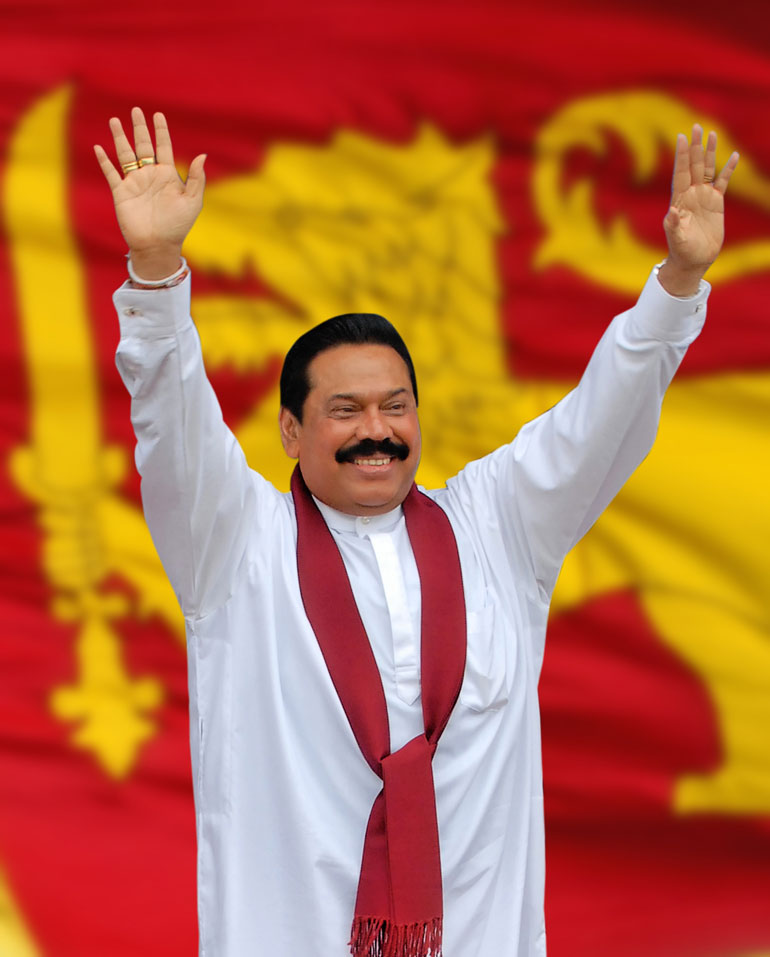Thursday Feb 19, 2026
Thursday Feb 19, 2026
Saturday, 27 June 2015 00:00 - - {{hitsCtrl.values.hits}}
Fettered freedom is worse than the manacles of forthright servitude – S.W.R. D. Bandaranaike

Former President Mahinda Rajapaksa
Mahinda Rajapaksa – two-term President, vanquisher of Velupillai Prabhakaran, incarcerator of his opponent in his bid for a second term, manipulator of the Judiciary, architect of the 18th Amendment – claims prescriptive rights over the party founded by S.W.R.D. Bandaranaike. Citing the 5.8 million votes he garnered, he insists that he is still the most potent leader in the SLFP-led political alliance that is called the UPFA.
He is patently the idol of the cash-and-carry political class. He is the sole panjandrum of a plutocratic priesthood that finds protest more lucrative than preaching. He exudes the aura of a Sinhala Caesar.
His main constituency is the ‘Mudalali class of the digital age’ personified by Parliamentarians Kumar Welgama, Bandula Gunawardane and Mahinda Yapa Abeywardene. They are virtuoso performers of atrocious Sinhala one-liners bereft of ethical niceties. They have perfected the system of political spoils totally at the disposal of their own cohorts.
Mahinda Rajapaksa does not hide his lust for power. The Roman historian Tacitus described lust for power as the most flagrant of all passions. It is for the people of Sri Lanka to decide whether they would reward an individual’s lust for power.
That no Buddhist Prelate has voiced an opinion on the subject of the ‘naked brazen lust for power ‘is evidence of our secular credentials!
Successor and beneficiary of J.R. legacy
But does Mahinda Rajapaksa who fettered our freedoms, belong in the SLFP? The answer is an emphatic no.
Should he field his own team at the next elections? The answer is an emphatic yes. His participation in the next election will remove the fog of cliquish politics and redraw the ideological boundaries in our fractious polity.
Post-war Mahinda Rajapaksa is the true successor and beneficiary of the J.R. Jayewardene legacy: dispassionate neoliberal economics. It is Mahinda who gave Colombo a facelift and promoted a new ‘corporatism’ based on market fundamentalism. It is Mahinda who built up the cult of the rich that we see burning its belly fat on the ample jogging tracks that encircle nearly all public space in the city.
With the kind help of the Rajapaksa brothers we have got our class act together. Mahinda Rajapaksa has shaped our credit card habits. The consumption culture that has taken root has made excessive consumption, natural and normal.
The Rajapaksa imprimatur arouses middle class angst over the return of the street vendors. The pavements can be cluttered up with gyrating ‘bozos’ distributing blurbs about the latest smart phones. But not by an itinerant trader selling his own produce. Well-dressed boys and girls seated at makeshift desks that obstruct pavements, explain the virtues of electronic gadgetry, irrelevant but essential to life in the fast lane. It does not matter how many could afford hoppers at Arcade at Rs. 200 apiece. Ours is a sterilised city where the homeless and the landless are in quarantine!
Mahinda finished the job JR embarked on
This writer learnt recently that his daughter and a visiting niece from ‘down under’ had actually had a fine dining experience in a place called Asylum in Gota’s refurbished Independence Arcade! It was from this same building that housed the Ministry of Public Administration that this writer, then a reporter for the Ceylon Daily News, listened to J.R. Jayewardene biding adieu to Dudley Senanayake – the ‘Bath Dun Piya’ – “good bye sweet prince, may the devas sing you to thy sleep.”
What is missed here is that Mahinda finished the job JR embarked on in more than one sense. He reversed Vadmarachchi. He successfully imposed a fascism in ‘velvet gloves’ that JR intended to but was thwarted by eruptions in the north and the south. The young corporate decision makers in their late thirties and early forties complain that the throbbing vitality of the gung-ho economy has evaporated.
Though Mahinda was deposed, the Mahinda machine has survived. The priority for him is to return on time to ensure that it is not dismantled.
Another government
President Maithripala Sirisena is now discovering that there is yet another government beneath the surface of his administration. As in all societies of post-colonial lands, we too have an ‘establishment’ that is independent of the publicly-elected leaders.
The genius of Mahinda Rajapaksa was his ability to acquire the establishment with the tacit connivance of that part of the ‘establishment’ presently in political Opposition but committed to its long-term interests. The ‘establishment’ is a social network with its own code of conduct committed to its own enrichment and perpetuation. The association of the term ‘Perpetual’ with the country’s public debt is not a coincidence. Ideology has never defined politics of Sri Lanka since independence.
The common candidacy of the General Secretary of the SLFP was the result of an awakening of the SLFP, to the reality of its ‘forthright servitude’ to the Rajapaksa monolith.
Repossessing the party
While announcing his insurgent candidacy for the presidency of the Republic, he was quite explicit in his determination to repossess the party. The open rebellion was the manifestation of a deep-seated yeaning within the party to move away from the Machiavellian realism of the Rajapaksa brothers. To the Rajapaksa family, politics was the conquest and maintenance of power.
Either by accident or design the SLFP at its core remains true to the Aristotelian tradition and the ‘romance’ of pursuing the ‘common good’ of the ‘gathered multitude’. Let us be cautious. Any attribution of Aristotelian traditions to Nimal Siripala, Susil Premajayanth or Anura Priyadharshana Yapa would be unpardonable libel on the poor Athenian thinker.
The SLFP founder was far removed from Machiavellian stratagems. He was closer to St. Thomas Aquinas, the medieval successor of Aristotle. SWRD in his independence day musings of 1953, wrote “ On the spiritual plane, Buddhism achieves the acme of freedom: the human mind , in order to profit from liberty , must itself be disciplined and controlled – not by some arbitrary , external force, it is true , but by oneself.”
S.W.R.D. Bandaranaike and the UNP differed on something very basic. The UNP the party that stood for property rights upheld the law. The SLFP of S.W.R.D. Bandaranaike upheld justice.
A half century later, the SLFP is still propelled by its foundational achievement of the recognition that the common good of the multitude was a life that conformed “to the essential exigencies and the essential dignity of human nature”.
Liberating freedom
Maithripala Sirisena’s revolt within the party was his realisation that the freedom of the SLFP itself was in jeopardy. As its General Secretary he was not exactly manacled. Yet forthright servitude was the order of the day.
Understandably there is speculation that factions of the UNP are colluding with the Mahinda restoration group. That would be natural. That should indeed be so.
Machiavelli advices the Prince “ a wise prince ought to adopt such a course that his citizens will always in every sort and kind of circumstance have need of the state and of him, and then he will always find them faithful”.
S.W.R.D. Bandaranaike was no fan of Machiavelli. He is the only leader of independent Sri Lanka who ruminated publicly on the concept of freedom. Today the task of President Sirisena is to ‘liberate’ freedom fettered by greed and strife from a Parliament that has outlived its purpose.
As the political philosopher John Gray notes: “We’ve come to believe that freedom is the natural human condition, which only tyrants prevent everyone from enjoying – but when a tyrant is toppled, we can’t know what will come next.”